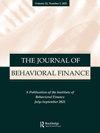Investor’s Intrinsic Motives and the Valence of Word-of-Mouth in Sequential Decision-Making: Modeling of Triple Serial Mediation
IF 1.7
3区 经济学
Q3 BUSINESS, FINANCE
引用次数: 0
Abstract
Word-of-Mouth (WoM) is a socially embedded process, and investors engage in social considerations to achieve self-motives. Investors attempt to share negative WoM (NWoM) to emotionally connect (self-affirm) to strengthen existing social ties following prior losses. In contrast, investors attempt to share positive WoM (PWoM) to self-enhance to attract others into developing new social ties. Thereby, this study aims to predict the impact of prior losses or gains on investors’ later decisions by engaging in the valence of WoM to achieve different underlying self-motives and social-motives. This study used experimental data and employed PROCESS tool model 6 to check the validity of the proposed triple serial mediation model. Findings support the viability of the triple mediation model that investors seek to achieve different underlying self-motives and social-motives manifested in PWoM or NWoM, following prior gains or losses. Investors seek to self-affirm by strengthening components of social-motives through engaging in NWoM, following prior losses. While investors seek to self-enhance to develop components of social-motives through sharing PWoM, following prior gains. Findings provide significant implications for researchers, managers, financial advisors, and analysts. Researchers, managers, and analysts can incorporate investors’ intrinsic factors in traditional economic models to better predict investors’ economic behavior. Financial advisors need to understand self-motives and social-motives that change clients’ risk attitude and frame investment advice to achieve particular clients’ self-motives and social-motives.投资者内在动机与口碑在序列决策中的效价:三重序列中介模型
口碑营销是一种社会嵌入过程,投资者通过社会考虑来实现自我动机。投资者试图分享负面口碑(NWoM),以建立情感联系(自我肯定),以加强先前损失后现有的社会联系。相反,投资者试图分享积极的口碑(pom),以提高自我,吸引他人发展新的社会关系。因此,本研究旨在通过参与口碑的效价,以达到不同的潜在自我动机和社会动机,来预测先前的损失或收益对投资者后期决策的影响。本研究采用实验数据和PROCESS工具模型6来检验所提出的三序列中介模型的有效性。研究结果支持三重中介模型的可行性,即投资者寻求实现不同的潜在自我动机和社会动机,表现在PWoM或NWoM中,在先前的收益或损失之后。投资者在先前的损失之后,通过参与NWoM来加强社会动机的组成部分,以寻求自我肯定。而投资者寻求自我提升,通过分享pom,在先前的收益之后,发展社会动机的组成部分。研究结果为研究人员、管理人员、财务顾问和分析师提供了重要的启示。研究人员、管理者和分析师可以将投资者的内在因素纳入传统的经济模型,以更好地预测投资者的经济行为。财务顾问需要了解改变客户风险态度的自我动机和社会动机,并制定投资建议,以实现特定客户的自我动机和社会动机。
本文章由计算机程序翻译,如有差异,请以英文原文为准。
求助全文
约1分钟内获得全文
求助全文
来源期刊

Journal of Behavioral Finance
Multiple-
CiteScore
4.60
自引率
10.50%
发文量
34
期刊介绍:
In Journal of Behavioral Finance , leaders in many fields are brought together to address the implications of current work on individual and group emotion, cognition, and action for the behavior of investment markets. They include specialists in personality, social, and clinical psychology; psychiatry; organizational behavior; accounting; marketing; sociology; anthropology; behavioral economics; finance; and the multidisciplinary study of judgment and decision making. The journal will foster debate among groups who have keen insights into the behavioral patterns of markets but have not historically published in the more traditional financial and economic journals. Further, it will stimulate new interdisciplinary research and theory that will build a body of knowledge about the psychological influences on investment market fluctuations. The most obvious benefit will be a new understanding of investment markets that can greatly improve investment decision making. Another benefit will be the opportunity for behavioral scientists to expand the scope of their studies via the use of the enormous databases that document behavior in investment markets.
 求助内容:
求助内容: 应助结果提醒方式:
应助结果提醒方式:


